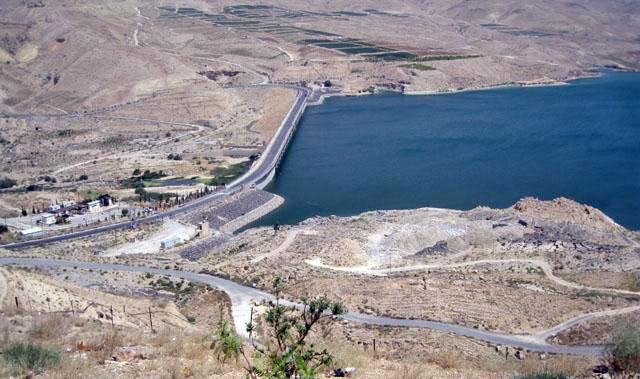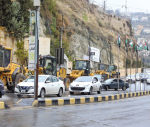You are here
Experts call for long-term adaptation strategies to strengthen climate resilience in agriculture
By Heba Elayyan - Feb 22,2025 - Last updated at Feb 22,2025

An aerial photo of Mujib Dam in Karak Governorate with farmland in the background (FIle photo)
AMMAN — The agricultural sector is on the frontline of the climate change crisis, facing unpredictable weather patterns, extreme temperatures, and water scarcity.
Farmers are struggling to protect their crops, while experts warn of worsening conditions.
"Climate change has significantly disrupted agriculture," said Sohaib Ayyad, an agricultural engineer specializing in seeds, fertilizers, and pesticides.
He added that planting seasons are shifting, and rainfall shortages are delaying crops, forcing farmers to take costly measures to protect their yields.
The impact is reflected in staple crops like wheat and barley. “This time last year, wheat and barley stood at 20-30 cm. This year, they barely reach 10-15 cm,” Ayyad said.
Extreme temperatures are another issue caused by climate change. Ayyad explained, “Garlic, for example, requires a temperature range of 17 to 25 degrees to grow naturally. If it gets too cold, farmers have to spend more on protection. This week’s forecasted temperatures could be disastrous."
Ayyad also said, “The lack of rain increases soil salinity, making it even harder for crops to thrive.”
Omar Shoshan, President of the Jordan Environment Union, said that the crisis is no longer just an environmental issue, but a global security threat.
“Climate change is no longer a phenomenon; it has become a crisis,” he said.
Shoshan said that industrialised nations have failed to uphold their commitments under the Paris Agreement, increasing the environmental and economic threats facing Jordan.
The Paris Agreement, a legally binding treaty adopted in 2015, aims to limit global temperature rise to below 2°C above pre-industrial levels, with a preferred target of 1.5°C. However, the latest data from the Intergovernmental Panel on Climate Change (IPCC) and the World Meteorological Organization (WMO) reveal that 2024 has already surpassed this threshold, marking a dangerous acceleration of global warming.
"Since 2015, global temperatures have continued to rise, culminating in record-breaking heat in 2023 and 2024. If we continue on this path, we will fall far short of the Paris Agreement's goals," Shoshan warned.
He also warned of broader consequences. By 2030, he predicts worsening poverty, displacement, and political instability. “Unlike wealthier nations, Jordan does not have the resources to recover quickly from climate disasters."
The agriculture sector, he says, is the first and hardest-hit sector. “Farmers rely on predictable seasons. But when winter rains fail or summer temperatures spike unexpectedly, their entire livelihood is at risk."
Pests, frost waves, and shifting market demands add to their struggles, he said, adding "I witnessed this impact on my family's olive farm, where a single frost wave destroyed 3,000 trees, causing severe financial losses".
A national plan to combat climate change has been launched by the Ministry of Agriculture in partnership with the Ministries of Environment, Water, and Local Administration, acknowledging the urgent need for action.
Lawrence Majali, spokesperson for the Ministry of Agriculture, outlined Jordan’s comprehensive plan through sustainable water management strategies and advanced technologies.
“We are focusing on expanding green cover by planting artificial forests in the north and south. We are also utilising treated wastewater to sustain vegetation in arid regions. Over the past three years, we’ve built 155 soil dams in the east to conserve water and ten major dams in the west to sustain agriculture,” he said.
Regarding advancements in water supply technologies, Majali highlighted innovations in sustainable agriculture, like hydroponics and aquaponics, which significantly reduce water consumption compared to traditional farming methods.
To help farmers adopt modern technologies, the government is offering financial incentives, Majali said. "Agricultural loans for alternative energy and water-saving technologies now come with zero interest."
The ministry is also partnering with cooperative associations to fund and implement these innovations, ensuring farmers across Jordan benefit from modern, water-efficient agricultural techniques.
Related Articles
AMMAN — The "early" formation of frost in the northern and central parts of the Jordan Valley indicates a climate change that could herald m
AMMAN — The government should provide farmers with early-warning frost detection systems instead of advising against planting crops that are
AMMAN — The Ministry of Agriculture on Tuesday urged farmers to cultivate vegetables that can withstand freezing temperatures, to avoid loss















